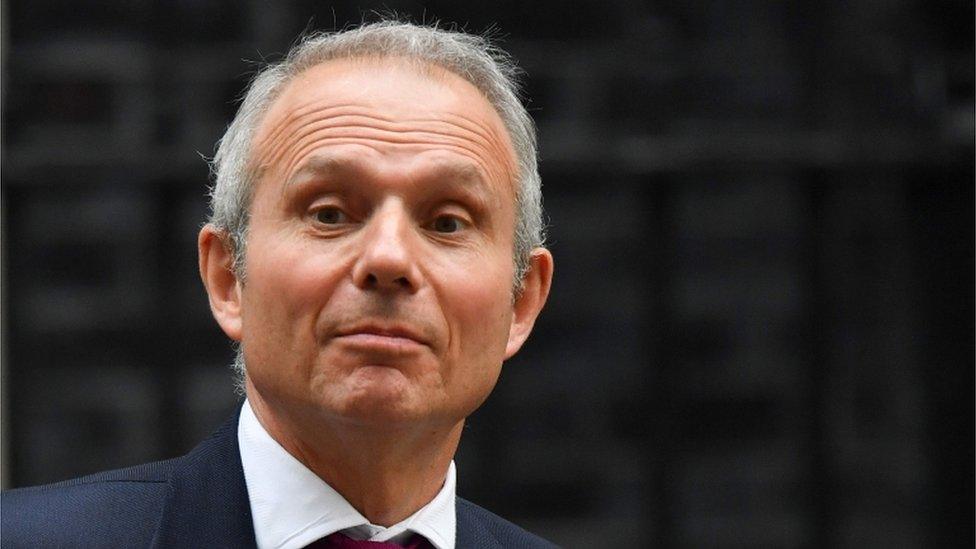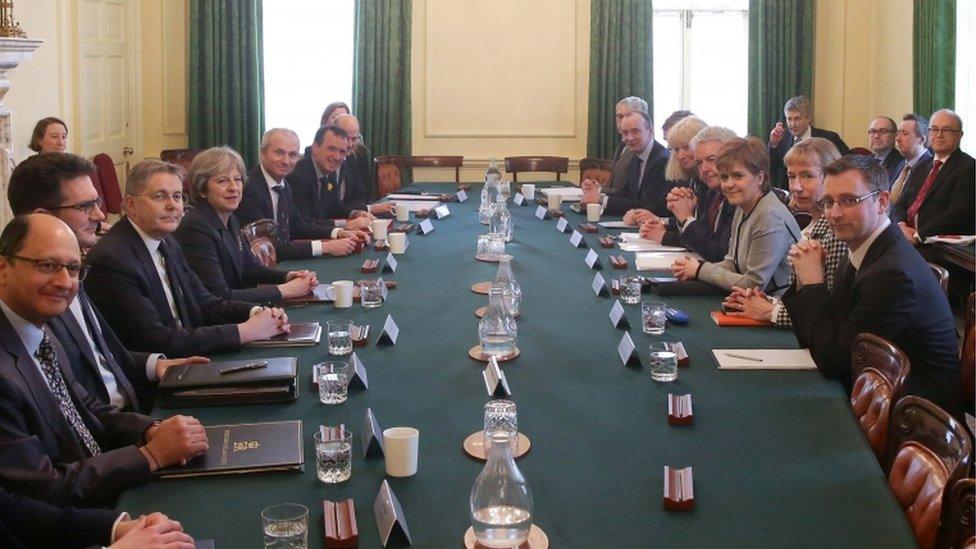Scotland Brexit: 'Door still open' for powers deal
- Published
- comments

David Lidington is in Edinburgh to speak at a business lunch
The UK government has told its Scottish counterparts the "door is still open" for a deal to end the long-running Brexit powers dispute.
Despite months of talks between the two sides, the Scottish government has said it cannot yet sign up to the UK government's Brexit bill.
It says the bill could see some of Holyrood's powers constrained by Westminster for up to seven years.
MSPs are due to vote on whether to formally consent to the bill next week.
The SNP has been joined by Scottish Labour, the Greens and Liberal Democrats in opposing the bill as it currently stands - with only the Conservatives thought likely to back it in next Tuesday's vote.
Speaking as he visited Glasgow on Friday, Jeremy Corbyn said he would be "very happy" for Scottish Labour to vote against the bill as he accused the UK government of mounting a "power grab" on devolution.
But UK Cabinet Office Minister David Lidington insisted it was not too late to reach an agreement before the vote.
Mr Lidington, who has been leading the negotiations for the UK government, was in Edinburgh to speak at a business lunch.
'Legal uncertainty'
It is understood no talks with Scotland's Brexit minister, Michael Russell, were been scheduled.
The UK government has already agreed to change some aspects of the EU Withdrawal Bill, which led to the Labour government in Wales dropping its opposition last month.
Mr Lidington told the CBI Scotland lunch that it was now for the Scottish Parliament to decide whether or not to accept the same "compromise" that had been reached with the Welsh.
He added: "That is why I say to the Scottish government: the door is still open.
"At a stroke, they can join the Welsh government - who have also put so much into getting us to this stage - and recommend to the parliament here in Holyrood that we should end any lingering question of legal uncertainty for businesses in all parts of the UK."

What is the "power grab" row about?

Months of talks between the two governments have failed to reach an agreement
The UK government has published proposals that would see the "vast majority" of the 158 areas where policy in devolved areas is currently decided in Brussels go directly to the Scottish and Welsh parliaments after Brexit.
But it has also named 24 areas where it wants to retain power temporarily in the wake of Britain's exit from the EU, including in areas such as agriculture, fisheries, food labelling and public procurement.
It says the "temporary restriction" on the devolved governments using some of the powers returning from the EU is needed "to help ensure an orderly departure from EU law" and allow the same rule and regulations to remain in place across the whole of the UK.
But the Scottish government argues that it would leave Holyrood unable to pass laws in some devolved areas for up to seven years.
It has produced its own alternative Brexit legislation, which was passed by MSPs in March but is currently subject to a legal challenge by the UK government.

At the same event, CBI president Paul Dreschler said that business is "committed to making a success of Brexit" but will warn that it needs "frictionless trade with the EU" for that to happen.
The business leader stated: "All the evidence suggests that being in some form of customs union with the EU, alongside a deep relationship with the single market and an open approach to migration is the best thing for business."
Mr Corbyn was in Glasgow to call for the contracts for three new Royal Fleet Auxiliary support ships to be awarded to UK yards.
When asked about the Brexit row, he accused the UK government of "taking powers from Brussels that then ought to go to Scotland, Wales and English regions and instead hoarding them in Whitehall".
Mr Corbyn added: "That is unacceptable to us and we have made that very clear.
"We are a party of devolution. Therefore, devolution sometimes throws up interesting answers. I'm quite happy about that because that is what devolution is about, people making their own decisions."
Responding to Mr Lidington's speech, Mr Russell - the Scottish government's Brexit minister - said the Conservative government at Westminster was in "complete, utter chaos over Brexit".
He added: "Just months before we leave the EU, there is still no clear plan for our future relationship with the EU, and we have the unedifying spectacle of the foreign secretary saying that his Prime Minister's preferred customs option is - in his words - 'crazy'.
"On the Withdrawal Bill, the Scottish government has set out the solutions for an agreement - and this week a cross-party committee in the Scottish Parliament outlined how these could be achieved, leaving the Tories isolated in their attempts to undermine devolution.
"If David Lidington wants business and citizens across the UK to have clarity, his government could do so tomorrow by committing to remaining in the single market and the customs union - which is, after all, what the Scottish Parliament and the Scottish people voted for."